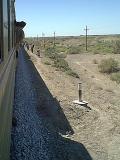
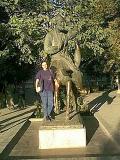
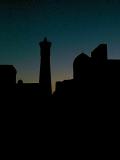
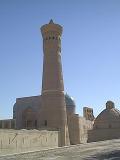
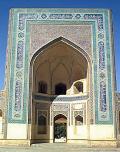
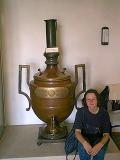
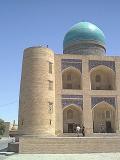
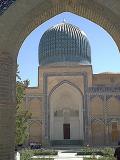
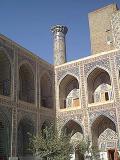
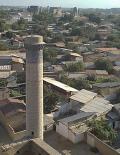
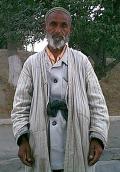
|
Briefly before reaching Bukhara, our first stop in Uzbekistan, our train is halted suddenly in no man's land. We see children and teenagers jumping off the train and running away with lots of bags and luggage. The train is being robbed! The bags and suitcases disappear as fast as the children, who jump into trucks and cars waiting alongside the railway. Some passengers run after the thieves, but without success to get back any of their robbed belongings. Obviously, the children had crept onto the roof of the train, from where they had opened the roof to access to the baggage parts of each compartment. Luckily, we are not missing anything. Finally, the train sets in motion again and we arrive in Bukhara. There we are kindly asked by the police to follow them to the police station in order to register our passports. We already fear the worst, but finally, the police officer is a friendly chap extremely interested in our travel journey. He writes down all our passport details into a large book (the registration journal). We chat there for another hour and learn a lot about the life of a police officer in Uzbekistan, e.g. that he earns 21000 Sum per month (approx. 30 USD), that he pays 1000 sum per month for his rent, that water, electricity and gas is free, that a liter of gasoline costs 150 sum etc. In the end, he tries to help us calling a travel agency in Bukhara, which is only a few kilometers from the train station. As it turns out, however, no direct calls are possible to the city from the station and he must ask for a connection. Finally we get the call! We thank the police officer for his help and exchange addresses.
Bukhara is a city with a lot of charm, a labyrinth of clay houses, old palaces and mosques, medressa, courtyards and beautiful gardens. We explore the city by foot and enjoy its atmosphere in the shadow of a huge mulberry tree. Bukhara was the capital of the Samanids in the 9th and 10th century and one of Central Asia's religious and cultural centers.
To our surprise, there are almost no cars on the roads, and the air is very clean. The desperate economic situation in Uzbekistan indeed makes owing a car a luxury only a few can afford. In the evening we visit an Uzbek folklore and fashion show, which would have impressed even the Italian designers. The show takes place in an appropriate setting: the old Medressa, school of Koran for 5 centuries.
The oldest building is the old fort of Bukhara (5th century), which was bombed and almost completely destroyed by the Russians during their conquest of Central Asia in 1920. In fact, most of the historic buildings in Bukhara have been destroyed (by earthquakes, invaders or neglect) and only recently been renovated or rebuilt. Worthwhile visiting is also the palace of the last Emir in Bukhara, a fairy tale castle where the more then 100 women of the Emir were living in his Harem.
We finally embark to Samarkand, the city of Timur. Two impressive medressa are built around the main place (Registan) with beautifully restored external facades featuring tigers laid in stone. Quite unusual for a Muslim medressa.
Timur, the national Uzbek hero and leader of the Timurids, made Samarkand capital of his empire in 1370. He is buried nearby in a surprisingly small mausoleum. His tomb lying underneath the mausoleum in a small crypt would not officially be accessible, had we not hired the guardian of the mausoleum to open the tomb for us. Of course this is a paid service and we are happy to pay one US Dollar to the men, who outs himself as the proud father of 7 children and the husband to 3 wives. He must be rich indeed!
Many buildings in Samarkand were only recently restored or are still under reconstruction/restoration. Paying a few extra sums, we can access the great mosque and climb one of its minarets. With flashlights and following the instruction of our guide, we take the steps (or the little of it that is remaining) into the sky and pray that there would be no earthquake or any other disturbance. From the top, we have a spectacular view on the domes, clay houses, minarets and small streets.
Nearby, a cousin of prophet Mohammed is buried, and we visit the mausoleum still under renovation (Shahi Zinda).
We notice that in Uzbekistan, most of the mosques, medressa and mausoleums, in contrast to Iran, are just used a tourist attractions. Instead of Koran students and praying people, the mosques and medressa are filled with souvenir shops, little kiosks or carpet presentations and other businesses. And the shop owners fight for every visitor to come in. So, instead of enjoying the historical buildings, we are strolling through piles of souvenirs, musical instruments, carpets and clothes. Needless to say that there is still a substantial admission fee required.
Finally we travel to Tashkent, the capital and largest city of Uzbekistan today with 3 million inhabitants. The city was mainly built by Russians and boosts a number of immense buildings in the Soviet area style.
We stay overnight with private people, whom we meet by chance at a bus station. In the Tashkent, the police is omnipresent again and we are being checked several times the metro stations. We soon find out that also our family, where we are staying, is uneasy, as they fear the police could discover them. In fact, private visits and homestays are not allowed in Uzbekistan unless properly announced and registered with the local authorities. But nobody discovers us and we finally leave toward Kyrgizstan.
Until a few years ago, there were still direct bus and train connections between Tashkent and Bishkek, the capital of Kyrgizstan. In fact, all of these connection, which allowed to travel quite easily in Soviet times within the Central Asian republics, have been cancelled. No direct bus or train would link Tashkent or Bishkek. Thus remain only the flight (approx. 150 USD per person), the journey over the mountains with taxi (about 2 days), or travel along the main street from Tashkent to Bishkek by bus or taxi. The problem with the latter is that this roads leads across territory of Kazakhstan, for which a transit visa are required. We decide to give it a try even though we have no visa.
With a minibus cramped with local peasants, we reach the Uzbek border post quickly. We must pass through four different border stations and fill out several declaration forms. Finally, we have to walk for half an hour to the Kazakh border post and the bus station, where a bus to Bishkek is about to leave. To our surprise, our regular Kazakh visa, which we will need later to enter Kazakhstan again from Kyrgizstan, is good to go through, even though it should not yet be valid.
Soon, we also learn about the greed of Kazakh custom officials. At the border post, visiting a toilet is 5 USD! However, the place is dirty and there is no toilet paper. Obviously, only a fool would pay.
Only a few minutes on the bus to Bishkek, police stop us again and check passports and luggage. Being the only Western European foreigners, we are called into a special office. Undiplomatically, the officials make it clear that they would like to have money from us. Their argument is that they could keep us for several hours, if they wanted, searching our luggage, and that we would better pay them a small fine. We decide that the best way of dealing with this situation is to be calm and direct, too. We explain the customer officers that asking tourists for money bluntly is not a correct way of welcoming guests. We let them search for a couple of minutes in one of our handbags. They are mostly interested in Petra's purse, which only contains a few Turkish lira banknotes, however. After a while, we decide that it should be better that we are going back to the bus waiting for us already for quite a while and we leave the room letting the greedy officials have a bottle of cold mineral water. None of the officials hinder us physically and so we get back into the bus, where the crowd of Kazakh and Uzbek people is interested to know how we managed to get out without paying a fine.
|
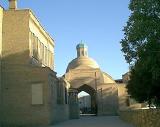
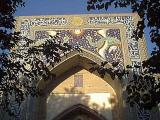
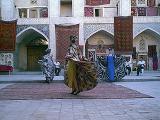
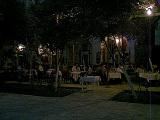
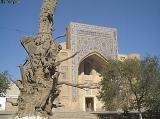
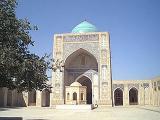
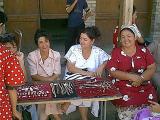
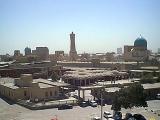
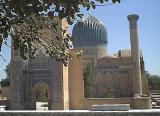
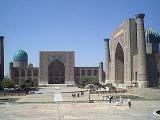
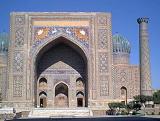
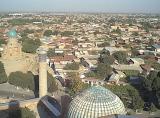
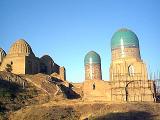
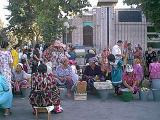
|